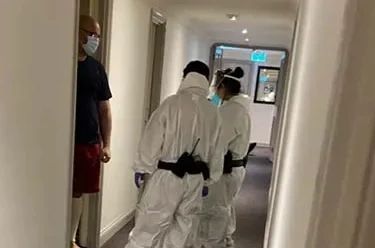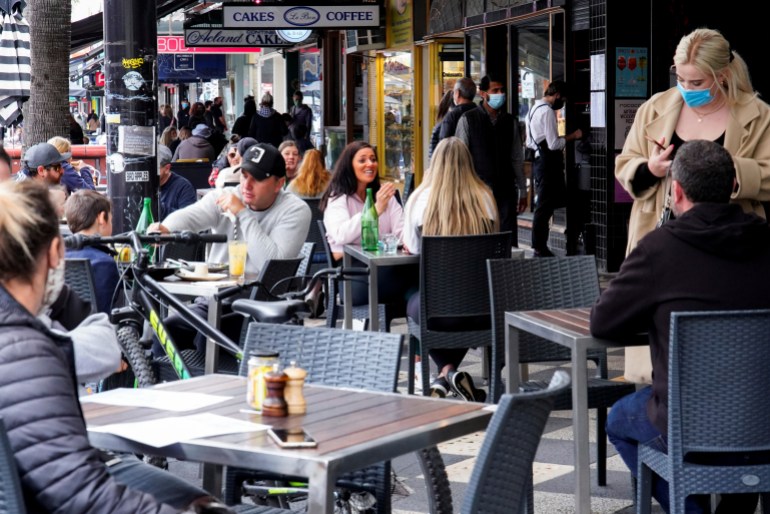Migrants seek release as COVID hits Melbourne detention facility
Detainees describe their dire situation inside a Melbourne hotel as the government continues to hold them despite the spread of infection.

A third of the refugees and asylum seekers held in a Melbourne immigration detention hotel have tested positive for COVID-19, according to the Australian Border Force (ABF), prompting more calls for the government to extend immediate medical care to the migrants and release them into the community.
The news comes as Melbourne exits its sixth lockdown, which came into effect after the Delta variant of the coronavirus led to a repeat of strict COVID restrictions earlier this year.
Keep reading
list of 4 itemsAre settler politics running unchecked in Israel?
Post-1948 order ‘at risk of decimation’ amid war in Gaza, Ukraine: Amnesty
UK passes bill to deport asylum seekers to Rwanda: What’s next?
As the virus continues to spread inside the detention facility, stress among the detainees is running high, with several people now symptomatic, one hospitalised and the remaining 45 in isolation or confined to their rooms.
Azizi, a refugee detained at the hotel, said he lost consciousness in the shower on Sunday after he got infected with the virus.
He has now received a positive COVID-19 test result and is isolated within the hotel with severe chest pain and breathing difficulties, as well as body pain.
“The nurse comes to me once every 24 hours to bring Panadol and take temperature. I haven’t seen a doctor at all,” he told Al Jazeera on Saturday.
Advocates for the detained migrants as well as human rights and migration activists said efforts to contain the virus inside the hotel have been too little too late.
Ian Rintoul, a political activist and spokesperson for the Refugee Action Coalition (RAC) who has contacts with migrants in the hotel, said the first few detainees who were infected with COVID-19 were tested and isolated on October 15. But they were already symptomatic for several days before that, he said.
By the time they were isolated, other detainees were already showing symptoms of infection as well, Rintoul added.
“So you’ve got this ridiculous situation where they know there are…people who’ve got symptoms. So they’re worried enough to put them in isolation and test them, they know that they’ve been mixing with the other 42 people, and they do nothing about those 42 people,” he said.
There are 46 refugees and asylum seekers in the facility.
‘No segregation’
Another refugee, Salah, who is detained with his son, said there was no segregation at all inside the hotel.
“All the refugees, [at the] same time they were all together, eating together, training together … they talked with the [staff], talked with everyone,” he said.
Eventually, on Sunday, ABF announced three positive results and began implementing mass testing following the spread of the disease.
In a statement on Friday, the ABF said, “Decisions around the containment of COVID-19, including limitations on movement to reduce the spread, are guided by state government health advice and directions. Staff and contractors entering the APOD [Alternative Place of Detention such as hotels] adhere to strict requirements governing physical distancing and use of Personal Protective Equipment.”
It also mentioned, “The ABF and its service providers are working closely with Victorian health authorities to manage contact tracing, quarantining, testing and cleaning.”
Rintoul, however, said there has been no “proper practice” throughout the process of COVID control at the hotel. Despite all the detainees being tested on Sunday, their results have not come back at the same time.
Jana Favero, of the Asylum Seeker Resource Centre (ASRC), said “some of the men who were tested on Sunday still haven’t got their test results back” almost a week later.
“In close confines, people displaying symptoms over a week ago, why wasn’t more urgent action taken?” she asked.
No proper physical distancing
Those who are quarantined at the hotel are also not effectively distanced from the rest of the detainees, Rintoul noted.
COVID-19 patients have been isolated on a different floor of the hotel, “[but] the whole place is air-conditioned, you can’t open a window. The chances are that … we’re going to get COVID throughout the hotel,” he said.
In a report, the Australian Human Rights Commission said hotels “are not appropriate places of closed immigration detention, given their lack of dedicated facilities for exercise, recreation and activities and limited access to outdoor space”.
As of June this year during the height of the pandemic, at least 80 detainees remained in such accommodation across Australia.

ABF again defended the system saying, “All detainees within the facility have been advised to quarantine in their accommodation rooms to reduce the risk of transmission.”
“Each detainee is accommodated in their own room with ensuite facilities. All detainees at the facility are being tested for COVID-19.”
Detainees and advocates alike said the staff and guards at the hotel likely brought COVID into the facility.
Still, there is also “no indication at all” that any contact tracing or testing have been implemented among the guards to find the source of the infection, said Rintoul.
“It is opaque,” he said. “The government does seem to think that the normal protocols, protocols that are strictly enforced in the wider Australian community, don’t apply to detention.”
Protocols under detention
Protocols vary between guards and detainees, Rintoul said.
For example, if a detainee is taken from the hotel for a medical appointment he is quarantined on return, but there is “no indication whatsoever” that the guards are also quarantined, he said.
Meanwhile, according to detainees at the hotel, those in quarantine are being held with virtually no medical care.
Salah, the migrant who tested COVID negative along with his son, told Al Jazeera that he checks his son for symptoms four to six times a day. “And he checks me also … what can I do?”
On Friday, ABF said those with COVID-19 symptoms “are closely monitored by the detention health service provider staff and are tested, quarantined and provided appropriate medical care”.
But according to Rintoul, there is just one nurse stationed at the centre from 8am to 4pm. The nurse is employed by the International Health and Medical Services (IHMS), which has been contracted by the government to provide healthcare to the detainees.
He said the services provided by IHMS are simply not adequate to cover a COVID outbreak, adding that some detainees also have serious underlying health conditions.
All of the refugees at the hotel were brought to Australia from offshore detention centres for medical treatment, said Favero, “so they’re at high risk. They’re vulnerable populations.”
Azizi, for instance, also suffers from migraine headaches and high blood pressure as well as breathing difficulty.
He said the diet the detainees are given at the hotel does not help either.
“In here [there is no] good food and good fruit,” he said, adding that his request for oranges and lemons has so far been ignored.
“Because of the lack of vitamins you also have vitamin deficiency diseases and your body is weaker,” said Jane Alcorn, who is advocating for Azizi’s freedom.
“The photographs I’ve seen of the food … you wouldn’t eat it. If you gave it to people in a restaurant in Australia, they wouldn’t eat it,” she added.
We have a Legal Observer Team out today at the @racvictoria #protest outside the Park Hotel in Carlton, monitoring how @VictoriaPolice will police the new @VictorianCHO directions. #VicPolWatch pic.twitter.com/NB0a9aj4Sz
— Melb Activist Legal (@ActivistLegal) October 23, 2021
Release of detainees
Meanwhile, ABF said vaccinations have been available for detainees since early August 2021 and “detainees continue to have access to information in a range of languages about the vaccine in order to make an informed choice”.
About 61 percent have received a single dose and 54 percent are fully vaccinated, it said. But figures released by the government on Monday show that only 52 percent have received a single dose and just 17 percent are fully vaccinated.
“There’s a degree of suspicion about IHMS … [detainees] regard IHMS as simply … an arm of Border Force [ABF], there’s absolutely no trust about what they’re being injected with or anything else,” said Rintoul.
“So many of them said [they’re] quite happy to be injected … but they would get vaccinated outside of the detention centre, not inside it.”
That would be the ultimate solution – to release the refugees and asylum seekers being held around Australia from detention and into the community, where they would be safer from the disease, said Favero.
“We’ve seen nearly 180 refugees released from detention, or APODs like hotel detention over the last 10 months,” she said.
“So the government actually has a solution in front of them. They should have done it for all, they should have done it earlier. This is absolutely on them.”
Refugees at the hotel call for the same action.
“I want freedom, for me and for my son, and for everyone here,” Salah said. “All [the] people are very tired. Very tired … Nine years they [are] waiting … for freedom.”
“Please … my son, he was 14 and now 23. It’s not fair.”